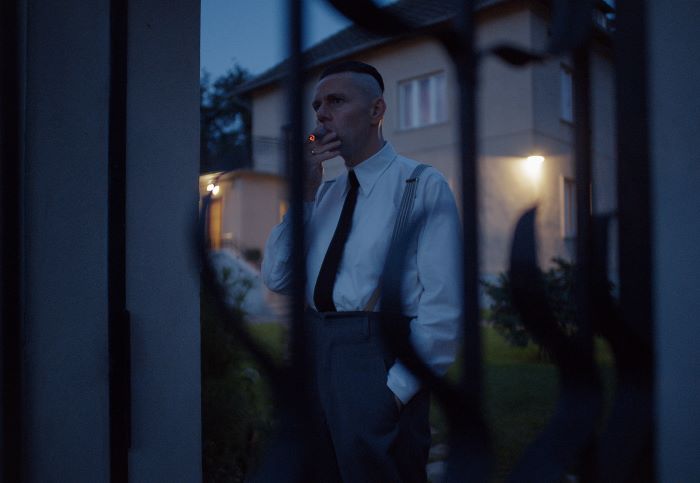![]() Just when cinematic representations of the systematic genocide against the Jews by the Nazi regime have almost become a genre of their own, with tropes and conventions that sometimes have ended up trivializing it (think of the recent Jojo Rabbit as a regrettable low point), a new film arrives as an essential addition to the representation of the Holocaust.
Just when cinematic representations of the systematic genocide against the Jews by the Nazi regime have almost become a genre of their own, with tropes and conventions that sometimes have ended up trivializing it (think of the recent Jojo Rabbit as a regrettable low point), a new film arrives as an essential addition to the representation of the Holocaust.
During an idyllic day in the countryside, a family enjoys a summer day. The camera initially remains distant, observing the blonde adults with their rosy-cheeked children enjoying themselves in a riverside Edenic garden. Next, the family has come home to a large house with its many servants. Conversations gradually discloses that the father, Commandant Rudolf Höss (Christian Friedel), and his kin live right next to his workplace. If the barbed wire fence near the residence or the chimneys in the background emitting clouds of smoke from time to time are not enough indicators, a casually mentioned name brings the time and place unmistakably to light: Auschwitz. Hellish sounds barely disrupt the domestic life of the household.
Director Jonathan Glazer, adapting Martin Amis’s novel, which is based on the real-life Rudolf and his wife, Hedwig (Sandra Hüller), and their children, with liberties, has made a Holocaust drama unlike any other. Narratively, the life portrayed here centers mainly on the trivial problems of the residence adjacent to the concentration camp and the potential marital drama between the spouses. These petty bourgeois conflicts exist separate from the mass murder being carried out next door.
Hedwig, known to her husband as “the queen of Auschwitz,” feels at ease, until her comfort is threatened when Rudolf is transferred to Berlin. She chooses to compromise her marriage by continuing her life in Poland with the children, even if it means she will only see Rudolf sporadically. For Hedwig, there is no better place where she can be waited on, mostly by local Polish women, and obtain luxury items from prisoners, despite the occasional gun shots, screams, and noise interrupting sleep.
Everyone in the Höss residence knows exactly what is happening nearby, although they almost never speak of it. But when they do, in passing, the conversations reveal a chilling indifference. When Hedwig’s mother visits, mother and daughter mention a Jewish woman they once knew—the mother was this woman’s maid—wondering if she is next door behind the wall.
The Zone of Interest intensifies its transparent conceptualization of evil with the unseen and from what can be heard just a few steps away. It is in its visual presentation that Glazer elevates the simple narrative to an artistic experiment about the viewers’ ability to intellectually and emotionally relate to what is happening offscreen. The static shots of the family at home give the impression of an impersonal surveillance camera, progressively alternating between rooms, halls, and gardens, as if to challenge the audience into being lulled into complacency. At times, Mica Levi’s score bursts in with a bang. Glazer restrains from any impulse to make viewers feel comfortable.
It would be tempting to summarize Glazer’s bleak viewpoint as an intellectual reflection on “the banality of evil,” a phrase that has been worn out to the point of conjuring less of what it denounces and ultimately embodying it (similar to what has happened with film’s depiction of the Holocaust). The Zone of Interest, one of the best films of 2023, is not meant to be liked in the traditional sense. Its power lies in becoming a devastating, sobering work of art. It achieves this by shaking up the grammar of cinema.
If Steven Spielberg in Schindler’s List created a masterpiece of dignity and hope with the noble purpose of strengthen our emotional connection to historical memory through the tools of fiction, Glazer has restored the factory of horror to shake off and challenge comfortable forgetfulness. What we can see is no longer enough. That’s why the film centers on echoes and the unseen that could have been easy to ignore. The final minutes include a chilling ellipsis that functions doubly as a reminder about how impermanent any empire ultimately becomes, but also something much more sinister: The former concentration camp has become another place where cleaners sweep away the daily dust.







Leave A Comment